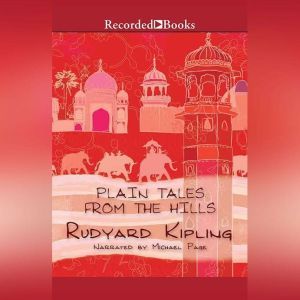

Plain Tales From the Hills
Author: Rudyard Kipling
Narrator: Michael Page
Unabridged: 7 hr 28 min
Format: Digital Audiobook Download
Publisher: Recorded Books
Published: 12/23/2016


Author: Rudyard Kipling
Narrator: Michael Page
Unabridged: 7 hr 28 min
Format: Digital Audiobook Download
Publisher: Recorded Books
Published: 12/23/2016
Short-story writer, novelist, and poet Rudyard Kipling was the first Englishman to receive the Nobel Prize for Literature and was hailed as a literary heir to Charles Dickens. His most popular works include The Jungle Books, Kim, and "The Man Who Would Be King." Audiences love his romantic tales about the adventures of Englishmen in strange and distant parts of the world. Characteristic of Kipling is sympathy for the children's world, a satirical attitude toward pompous patriotism, and belief in the blessings and superiority of the British rule. Although he was widely regarded as Britain's unofficial poet laureate, Kipling refused the honor, as well as the Order of Merit.
Kipling was born in 1865 in British-ruled Bombay, India, where his father was an arts and crafts teacher. At age six, he was put in a London foster home, and it was here that he began writing, influenced by his pre-Raphaelite ancestors. When Kipling was thirteen, he entered United Services College, an expensive military boarding school. His poor eyesight and mediocre grades ended his hopes for a military career. These years are recalled in a lighter tone in his book Stalky & Co.
Kipling returned to India in 1882, where he worked as a journalist, an assistant editor, and an overseas correspondent. Seven years later, Kipling moved back to London and married Caroline Starr Balestier, the sister of an American publisher and writer. They moved to the United States but, dissatisfied with life in Vermont and distraught by the death of his daughter, Kipling moved his family back to England. Still restless, he poured his energy into writing and produced The Jungle Books.
During the Boer War, Kipling spent several months in South Africa. In 1901, he published Kim, which is widely considered his best novel. Kipling received the Nobel for Prize for Literature in 1907. The prestigious prize was awarded for his power of observation, originality of imagination, virility of ideas, and remarkable talent for narration. Kipling died on January 18, 1936, in London.
This is a difficult book for me to review, since I read it as a freebie e-book. The table of contents sucks, and I can't go back and navigate the book -- at least not in a way that I can figure out. You get what you pay for. That said, a lot of these Kipling short story collections ARE available fre......more
For any author it's more difficult to deal with such stories (instead of novels) as you have less time and space to prove your skills and keep the reader alert. Mr. Kipling has some beautiful ones, as On The City Wall, some normal ones and a real piece of garbage: "Dray Wara Yow Dee".........more
A young subaltern, ribbed by his regiment for his sweet and gentle demeanour—especially cruelly ribbed by the Senior Subaltern—makes a public promise to repay the debt. A little boy, whose best friends happen to be the Indians he fraternises with, becomes the reason for an amendment in an important......more
Ugh - people on Goodreads reviewing books published 130 years ago complaining that they don't conform to modern ideals and sensibilities... You don't have to defend attitudes of the past to learn from reading about them, and Kipling's book is a fascinating glimpse of life for the British in Nineteent......more
This is book number two in my challenge to read the complete works of Rudyard Kipling, in the order in which they were published. I have fond memories of Kipling's Just So Stories from when I was a child, and I was later exposed to several of his short stories during my undergraduate years. After hav......more